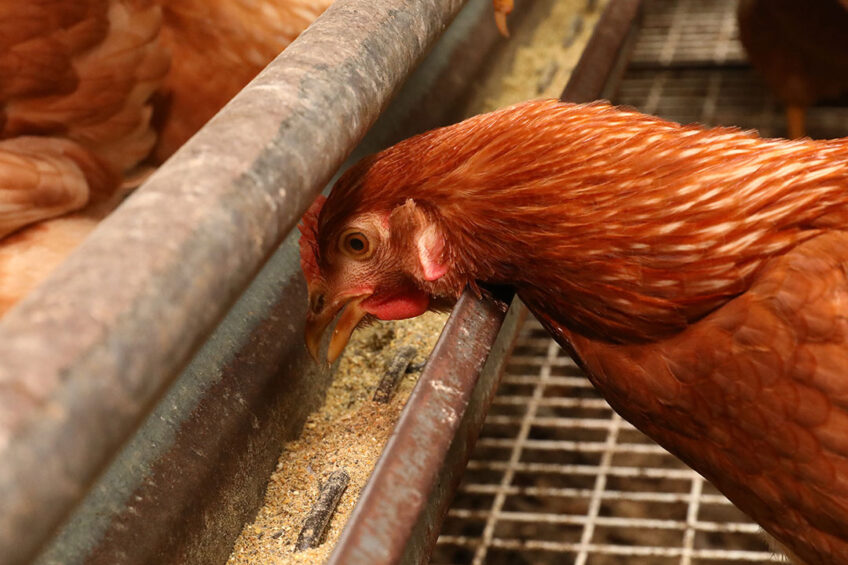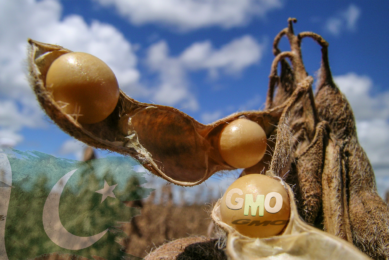Insect-based poultry diets to improve the health and gut status

This article will discuss nutritional composition and bioactive compounds of edible insects, and mechanisms by which insects promote gut health and functionality in poultry, modulate immune system, and promote growth performance in poultry.
Nutrition, ambient temperatures, and pathogens impact growth performance, reproduction traits, and overall health and welfare status in poultry. Pathogens cause gut microbiota imbalance and gut inflammation, disrupt digestive function, affect nutrient digestion and absorption, and impair the overall health condition of birds. However, due to the increasing concern of antibiotic-resistant microorganisms and drug residuals in poultry meat and meat products, it is essential to identify novel antimicrobial agents to improve health, welfare, and performance. Insects are a proper source of protein with well-balanced amino acid composition, numerous bioactive compounds, chitin, antimicrobial activity, and lauric acid with confirmed immunomodulatory effects, hypolipidemic efficiency, and growth promotion impacts.
Insects in poultry feed
Insects comprise of well-balanced nutrient contents including protein, crude fat, crude fibre, minerals such as copper, iron, magnesium, and zinc, and vitamins. Thus, insects are one of the best-suited feedstuffs to replace conventional protein sources such as soybean meal, fishmeal, or bonemeal in poultry feed.
Chitin of edible insects consists of:
5-20% carbohydrates
20-44% dry matter
37-63% protein
7-39% fat content
Factors affecting the nutritional composition values of edible insects include:
the life stage at which the insect is harvested
the rearing composition
the type and quality of feeds ingested
The larvae stage of yellow mealworm, black soldier fly, the maggot, and pupae of the housefly have relatively higher protein, amino acid profile, vitamins, and mineral values and source of chitin compared to other insect growing stages.
Bioactive compounds of edible insects
Chitin is one of the bioactive compounds in exoskeleton of insects with potential health benefits. The hypolipidemic and hypercholesterolemic characteristics of chitin stimulate innate immune response to various diseases. Insects contain bioactive peptides with antimicrobial, antioxidant, and antidiabetic properties. Insect peptides with antimicrobial properties include α-helical peptides such as cecropin and moricin, cysteine-rich peptides such as defensin and drosomycin, prolinerich peptides such as apidaecin, drosocin, and lebocin, and glycine-rich proteins such as attacin and gloverin. Antimicrobial peptides are effective as growth promoters and gut microbiota and immune system modulators with fewer ricks for the bacteria resistance.
Promoting gut health in poultry
Natural antibiotic, antipathogenic, and anti-inflammatory properties of insects larva makes them proper candidates to modify gut microbiota of poultry and to balance the proportion between the beneficial and harmful microbes. Furthermore, the bioactive compounds increase gut pH, compete exclusively with pathogens on receptors and nutrients, stimulate mucin synthesis, modify mucin compositions, and increase gut length, and weight. Moreover, chitin which is a polysaccharide fermented by the gut microbiota stimulates the development of immune system.
Effects on gut morphology
Gut morphology including the length, muscle thickness, villus height, crypt depth, and villus height to crypt ratio affects gut development, health, and functionality inducing nutrient digestibility and absorption. Villus height impacts the absorption rate and the proper ratio of villus height to crypt depth (long villus and shallow crypts) is an indicator of ideal gut morphology. Supplementing poultry diet with black soldier fly larvae meal improves gut morphology and increases nutrient absorption. In Japanese quails feeding yellow mealworm has a positive effect on villus height and crypt depth and modulates the gut microbial ecology without compromising the gut morphology and mucin composition.
Effects on humoral immune response of poultry
Modulating gut microbial community through insect-based diets impacts antibody titters and regulates immune system in poultry to serve as a barrier to harmful microbes. The establishment of proper balance between beneficial and harmful microorganisms is crucial for health improvements. Dietary supplementation of shrimp chitin inhibits the growth of foodborne pathogens and Salmonella in the broiler chicken’s gut. Furthermore, supplementing yellow mealworm and super mealworm reduces cecal E. coli and Salmonella spp. in broiler chickens. Diets containing yellow mealworm lower albumin to globin ratio and induce immune response and better disease resistance in broiler chickens. In laying hens and broiler chickens black soldier fly meal can safely replace soybean meal and fishmeal without any adverse health effects. However, black soldier fly larvae meal compromises autoimmunity in jumbo quails when included in higher levels.
Promoting growth performance of poultry
Dietary supplementation of black soldier fly larvae improves production performance, feed efficiency, and meat quality of broiler chickens. Insect meal can partially or completely replace soybean in laying hen diets without affecting the production performance and the feed efficiency. The addition of yellow mealworm or super mealworm improves the growth performance of broiler chickens and Japanese quails during the starter period. The improved growth performance is due to increased daily feed intake associated with the palatability of insect meal supplemented in the diet.
Challenges and perspectives
Although considerable studies have been conducted in broilers and laying hens, there are still some obstacles to the proper and efficient utilisation of insect meal in poultry industry. The quality and nutrient profile of insect-based poultry diets vary based on insect species, rearing medium, environment, and processing methods. However, due to the lack of large-scale production and stable supply of insect meal accurate evaluation of metabolisable energy and effective nutrient availability is challenging. In addition, it is recommended to update the processing methods to reduce the production cost and the risk of pathogenic contamination and disease spreading through poultry diet.
Concluding remarks
Gut health is a major factor affecting the growth performance and health status of poultry. Various features including gut microscopic structures, dietary compounds, balance between beneficial and harmful microorganisms, and intestinal barrier impact the gut health. Insect-based diets are a sustainable source of protein with proper amino acid composition and a source of antioxidants with antipathogenic properties modulating the development of digestive and immune system without compromising the production parameters and egg and meat quality. However, further reliable efficacy studies need to be performed to evaluate the health, immunomodulatory and functional effects of insect-based diet on various poultry species.
This article is based on the publication: Malematja, E., Manyelo, T., Sebola, N. et al. The role of insects in promoting the health and gut status of poultry. Comp Clin Pathol (2023).











